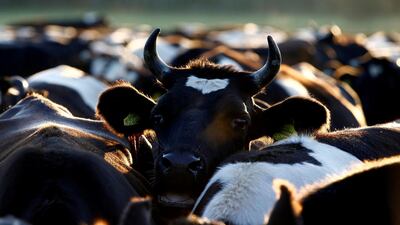Warnings that 45,000 cows could be slaughtered in Northern Ireland if the UK crashes out of the European Union without a Brexit deal cast renewed doubt over the British government's determined drive to leave the bloc by October 31.
Amid a series of forecasts of shortages and transport chaos, aides to Boris Johnson, the new prime minister, have vowed to defy attempts by parliamentarians to stop Brexit even it means a deposing the government.
After Mr Johnson made his position known, opposition party leaders declared they would demand an intervention by the monarch Queen Elizabeth to form a new government, forcing the prime minister out.
A BBC investigation has found that if new higher tariffs are imposed to British milk after Brexit, dairy farmers in Northern Ireland would be particularly vulnerable because a third of milk is processed in the Republic of Ireland, which would remain in the EU.
Price hikes as a result of tariffs would make British milk more expensive, while customs checks and legal changes could mean it is much more complicated to sell milk across the border.
Currently Northern Ireland dairy farmers export up to 800 million litres of milk to the Republic of Ireland each year.
An industry insider told the BBC that dairy cows must be milked otherwise they will bloat up and die.
"If there is no market, and farmers cannot sell their milk, they could only keep going for a very short period,” the source said.
"We're talking about hundreds of thousands of litres of milk going to waste, and then the farmers would have no choice but to reduce their herds."
The BBC reported that industry leaders felt their concerns had not been taken seriously by the British government.
Britain’s Department of Food and Rural Affairs said that the “widespread cull of livestock is absolutely not something that the government anticipates nor is planning for in the event of no-deal”.
"We will always back Britain and Northern Ireland's great farmers and make sure that Brexit works for them,” Defra said in a statement.
"The government is boosting its preparations to ensure we are fully prepared to leave the EU on 31 October, whatever the circumstances."
The report has been criticised by anti-Brexit campaigners.
“Culling cows is no solution to a no-deal Brexit. It’s a huge waste,” said Best for Britain supporter and Labour MP Owen Smith.
“And the fact these Northern Irish farmers are complaining about the government’s response to their concerns is no surprise. The people in charge of this process are desperate to see their twisted ideological fantasy realised and will stop at nothing.”
British prime minister Boris Johnson has said that he will take the UK out of the EU on October 31 with or without a deal.
Deputy prime minister Michael Gove, who has been placed in charge of making preparations for a no-deal outcome, met a number of organisations in Dover, on the south coast of England on Wednesday.
He was told by the Road Haulage Association (RHA) that a no-deal outcome would mean that lorry drivers could end up waiting in queues for 48 hours without access to welfare facilities.
Duncan Buchanan, policy director for the RHA in England and Wales, warned that if Britain were to crash out of the bloc, “the reasonable best-case scenario that authorities are working on is between 24 and 48-hour delays on all vehicles”.

